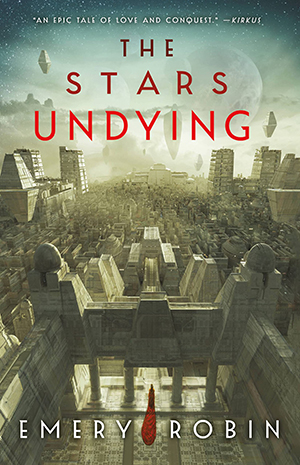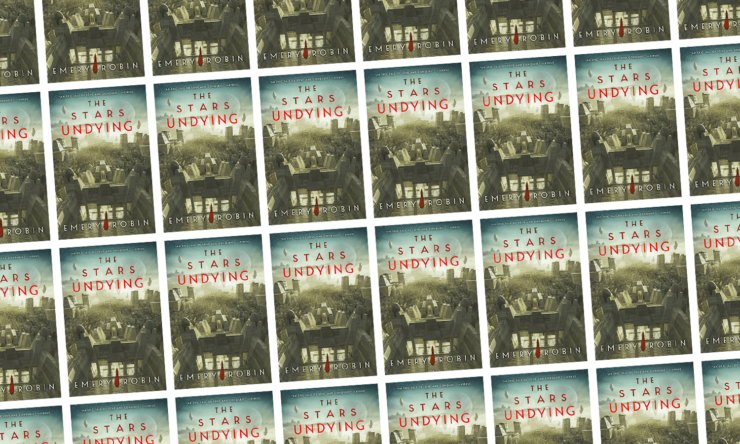Early on in The Stars Undying, Emery Robin’s Cleopatra-in-space-opera debut, the sci-fi analog for the infamous Egyptian queen has revealed herself to the Julius Caesar of interstellar expansion in a move that will be familiar to all of us who eagerly devoured ancient Egyptian history in sixth grade: Szayeti princess Altagracia Caviro Patramata has unrolled herself from a carpet to seduce Ceiao’s beloved commander Matheus Ceirran into joining her side to wrest back control of her planet Szayet (and her birthright, the Pearl of the Dead) from her own sister. Right before the kiss that will alter her kingdom and his empire, as he marvels at her crude yet effective gambit, Gracia quips, “Oh, please, Commander, tell me how you would have done it differently.”
There are a myriad of different approaches to a Cleopatra retelling, but Robin’s meticulous narrative choices dazzle. Though Robin follows the blueprints of the Cleopatra/Julius Caesar/Mark Antony love triangle, the space setting and the incorporation of technology (including some that approaches magic) elevate this trio of rulers and soldiers beyond their historical archetypes. This is a compelling (if slightly overlong) epic of couplings versus coups, worship versus heresy, memory versus immortality.
The superb worldbuilding hinges on the tiniest detail: a pearl, from the legendary story of Cleopatra demonstrating the magnitude of her wealth by dissolving a priceless earring in a goblet of wine. Quicksilver pearl is the literal building blocks of Szayet, as it can be sculpted into temples, conduct electricity… and house a complex supercomputer artificial intelligence. The Pearl of the Dead is Szayet’s greatest treasure and also its most controversial for nonbelievers, as it contains the entire lifetime and memories of its greatest ruler, the ancient conquerer Alekso Undying. Every leader of the Caviro line has had Alekso murmuring counsel into their ear; but whereas Gracia thinks herself—with her aptitude for scholarly texts and soft power—the ideal ruler, her sister Arcelia, a budding military strategist, considers herself the better vessel for Alekso.
Gracia’s conviction is so compelling as for there to be no question that Alekso exists in some form the same as she lives and breathes, yet it balances nicely with her discomfort at outsiders’ skepticism regarding Szayeti “cult paraphernalia.” The reader can hold both perspectives, which is crucial as the story hinges upon the belief that an artificial intelligence can approximate immortality for a larger-than-life man.
Buy the Book


The Stars Undying
While Ceiao looms large in the background, this is an epic of civil wars. Robin smartly grounds every conflict in the personal: Gracia versus Celia, a constant poignant throughline of sibling misapprehension even once Gracia has taken back the throne; Gracia versus Alekso, who sees less of himself in her than in her sister; Gracia versus Ceirran, though mostly as foreplay for their dynamic; Gracia versus Ceirran’s lieutenant Anita Decretan, whose regard ranges from irreverent to the rarely reverent.
When Gracia and Ceirran meet, each has become unmoored by a personal schism: she facing Arcelia at the barrel of a gun in their childhood bedchamber, he having tracked down his former mentor and current rival Quinha Semfontan to the skies over Szayet. It’s no wonder that each, having lost a beloved confidante-turned-reluctant rival, attaches themselves to one another so quickly. Yet they never entirely engage in the self-denial that this is anything but another partnership, if a more physically intimate one.
The knife-sharp edge of their triangle is Anita, Ceirran’s righthand woman (or, as Casey McQuiston quite accurately describes her, Mark Antony as “the hottest butch girl in space”). While this compellingly hedonistic soldier commands every figurative room she’s in, Ana’s significance to the main plot is difficult to parse, as she and Ceirran seem to play their own power game in which he pushes her away and she tests those boundaries. So by the time she engages with Gracia regularly on her own turf in Ceiao it’s difficult to truly know how to take Ana’s very intriguing moves.
Despite the anticipation of Gracia delivering herself to the greedy empire that would dissolve her like the pearl, the Ceiao portion of the novel is uneven. Much of the plot-moving conflict tends toward lofty philosophical debates, especially among Ceirran and his fellow members of the Merchants’ Council. In these sections, it’s unclear whose allegiance is to which people (and/or causes), even as a reader without all of the scholarly context grasps to remember who is supposed to be which Roman countryman, and when the Ides of March might occur in space. Yet when those differences in opinion manifest into petty slights and minor scandals, the action picks up again. No doubt about it, Robin’s talent is in the nitty-gritty details.
The final act of the book elevates Anita in a way that would feel too abrupt for a standalone, but this is the first in Robin’s Empire Without End series. With that in mind, Robin’s withholding of Ana earlier on makes much more sense. Here’s hoping that the next book will adopt her perspective opposite Gracia’s, because so much about Ana is teased (pink feather coat!) that I’m dying to know more about.
The Stars Undying is published by Orbit Books.
Natalie Zutter never thought she’d get so emotional over something so small as a pearl. Share your favorite SFF retellings of ancient mythology with her on Twitter!











A lot of people use different names at different times in this story, it seems. Well – I think that was a phenomenon in the real-world settings that it uses, too. The Wikipedia page for someone in that time called “Augustus” contains possible story spoilers and a few other names. I think approximately everybody was called “Gaius” as one of their names, men anyway, which is weird.